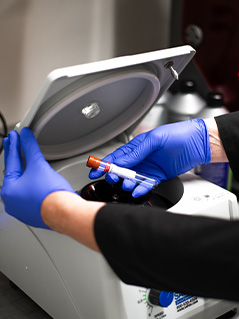Why You Should Choose a Dentist That Offers PRP/PRF Therapy
September 16, 2022

When looking for a dentist who places dental implants (or performs other types of oral surgery), you’ll probably be thinking about factors such as their qualifications and the location of their practice. But another thing you’ll want to consider is whether they offer PRP therapy or PRF therapy. These treatments can make all the difference during the recovery period following your procedure. This post explores the benefits of PRP/PRF therapy and why you want it to be part of the surgical process.
What are PRP and PRF?
PRP is short for “platelet-rich plasma” while PRF stands for “platelet-rich fibrin.” Both involve taking a small sample of blood from the patient and placing it in a centrifuge. The blood is separated into distinct layers, drawing out the platelets that encourage healing. The resulting PRP or PRF is then applied to the area where surgery has been performed to aid with recovery.
What are the Benefits of PRP and PRF?
Simply put, PRP/PRF therapy speeds up your recovery by helping your oral tissues regenerate more quickly. Naturally, this means less time having to manage your post-treatment discomfort. You can also look forward to returning to your regular activities sooner.
There are other advantages to consider as well. For example:
- PRP/PRF therapy can reduce the swelling that occurs after your procedure.
- PRP/PRF therapy can help seal off the surgical site, which lowers the risk of infection and makes it less likely that you’ll suffer from a painful dry socket.
- PRP/PRF therapy will increase the blood supply around the surgical site, allowing for a smoother healing process.
- PRP/PRF therapy is a non-invasive, all-natural treatment option.
Are PRP and PRF Right for You?
Most adults who have a dental procedure done are considered good candidates for PRP/PRF therapy. Both treatments make use of the patient’s own blood, so there are few if any risks to worry about. Some people might experience discomfort or irritation around the site where the PRP or PRF is applied; your dentist can give you tips for managing these symptoms.
All that said, patients with bleeding disorders such as hemophilia should not have PRP/PRF therapy performed. Your dentist will review your overall health history to confirm your candidacy for the treatment.
If PRF/PRP therapy is right for you, then you’ll definitely want to take advantage of it so that you can spend less time worrying about your recovery. When you reach out to your dentist to ask about dental implants or another advanced procedure, don’t forget to ask if PRP/PRF therapy is available.
About the Author
Dr. Cooper Owens has over 15 years of experience in the dental world so far. He takes a modern approach to dentistry so that his patients can always enjoy high-quality care. At his Geneva practice, he can place dental implants in-house, and he offers PRP/PRF therapy to aid with the healing process. To schedule a consultation with Dr. Owens, visit his website or call (440) 466-4884.
No Comments
No comments yet.
RSS feed for comments on this post.
Sorry, the comment form is closed at this time.
